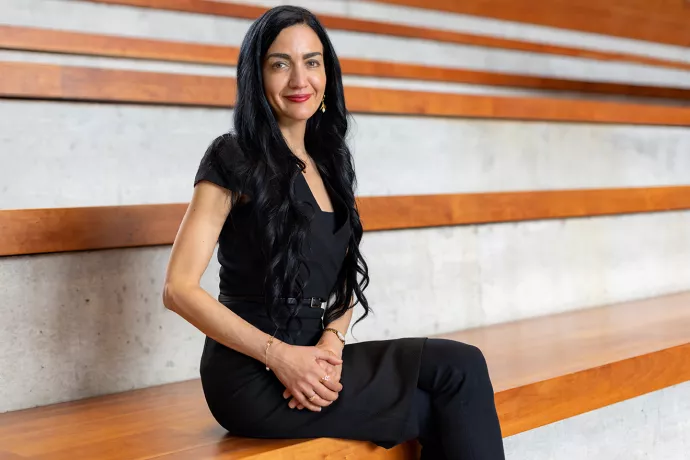UTM psychology professor wants to uncover the roots of child empathy

How do children develop empathy for others? And how can parents, educators and society promote healthy and positive child development?
That’s at the core of U of T Mississauga psychology professor Tina Malti’s new research that focuses on positive child development. Nominated by Leipzig University in Germany, Malti was awarded the Alexander von Humboldt Professorship, which runs from 2023 to 2027. As part of her proposed program of research she will co-ordinate a multidisciplinary research team at Leipzig focused on answering questions related to child empathy and development.
The research award offers €5 million for five years and draws top international researchers to German universities.
“It’s to understand the mystery of the caring child,” Malti says.
Malti’s past research focused on child socio-emotional development and mental health. She tests and develops measures that reinforce children emotionally to help them overcome trauma. Her research examined a wide range of the psychological effects of war and violence on children.
But with her Humboldt professorship, she wants to know how children develop positive attributes like empathy and caring.
“Much less is known about the roots of goodness and caring,” Malti says. “Where does it come from? And how can we nurture a caring child?”
She hopes to answer these questions with a program of research that includes a multidisciplinary team looking at the roots of positive development, its effects, and how those traits can be promoted in children.
“We are very excited because we believe this is a transformative approach that has the potential to contribute from the research side to the betterment of societies and ultimately to a more empathetic one,” Malti says.
Combining development psychology with clinical psychology, diagnostics, intervention, differential psychology and statistical methods, Malti’s research uncovers why some children start demonstrating a high level of empathy for others while others become aggressive and behave in harmful ways.
Through a series of studies, the multidisciplinary team will explore childhood caring, how receiving care matters for child development, and the consequences of caring for children, families, and communities. The goal, Malti says, is to reimagine systems of child development and inform public health and educational frameworks with best practices.
While she has always been fascinated with child psychology, Malti was greatly inspired by her father, a Palestinian immigrant to Germany in the 1950s.
“He taught me many lessons about inclusion and the similarities between people,” she says.
She learned that similarities create space for inclusion. It’s that potential she sees in children, as “a child’s mind is open and explorative.”
A psychology professor at UTM since 2017, Malti is the director of UTM’s Laboratory for Social-Emotional Development and Intervention, and the founding director of Centre for Child Development, Mental Health, and Policy.
She plans to divide her time between UTM and Leipzig over the coming years during her professorship. At Leipzig, she’ll work in collaboration with the Humboldt Institute for Child Development. While at UTM, she will remain director for the Centre and share research between the two institutions. Through UTM, she and her team work closely with the Region of Peel and local community organizations to share research and best practices based in research-based knowledge for policy recommendations.
“Ultimately my mandate is public policy,” Malti says. “My mandate in Germany is also public policy. We want to influence global policy on child development, because there needs to be global policies in place that speak to those issues for every child, independent of religion or where they’re from.”
Malti hopes the research will generate information for stakeholders, make knowledge available to the general public, and increase awareness for issues related to positive child development.
“The potential for empathy with others is infinite, even in young children, and we are able to overcome trauma, even very severe trauma.,” Malti says. “We can become even stronger and even more caring as a result, which sounds paradoxical. But that is very much what our data shows.”



